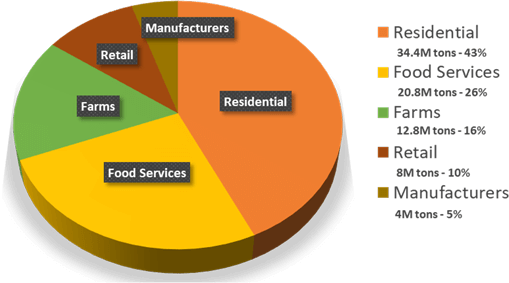The Issue
Annually, 1.3 billion tons of food go to waste. On the other hand, approximately 690 million people worldwide suffer from chronic malnutrition and struggle to put food on their tables. The consequences of food waste go beyond hunger; as a whole, it has far-reaching effects on the environment, economy, and society.
Food waste affects food security in a variety of ways. Throwing away good food is a missed opportunity to feed people struggling to eat. Additionally, the resources used in food production, delivery, and disposal also go to waste, which is detrimental to the environment and increases food prices.


U.S. Foods Waste
Yearly, in the United States alone, more than 40% of all food goes to waste. Over 113 billion pounds of food go to waste,
while 1 in 8 people lack food. This alarming situation highlights the urgent need for innovative solutions to redistribute excess food, mitigate environmental damage, and alleviate hunger in our most vulnerable communities. We believe that food waste is a solvable problem, and we are committed to working toward a world where no one goes hungry – where all eat.
1 out of 5 Children In the U.S.
- 90% of children who are food insecure are more likely to have poor academic performance
- 30% are at greater risk of developing chronic health conditions from malnutrition such as obesity, diabetes, hypertension, and mental health issues
- 53% have a higher risk of depression
- 22% have a greater chance of experiencing anxiety


Food insecurity among workers
Despite working full-time, many working Americans still struggle to put food on the table, pay their rent, and meet other basic needs. According to a report by the USDA, more than 35 million people in the U.S. live in food-insecure households, which means they need more consistent access to adequate amounts of food required to lead an active and healthy life. Sadly, among those households, 14 million suffer from food insecurity; thus, some household members have to skip meals or reduce their food intake.
Economic and Environmental loss
In the United States, the problem of food waste and energy is a significant issue affecting our economy and the environment. Each year, an estimated 40% of the food supply in the United States ends up in landfills, representing millions of dollars’ worth of wasted resources, including water, energy, and labor, which has profound implications.
- Food waste cost the U.S. economy 218 billion dollars annually
- Generates around 8% of global greenhouse gas emissions. If it were a country, it would be the third-largest greenhouse gas emitter in the world.
- The production of food requires a significant amount of resources, including water, land, and energy. When food is wasted, these resources are essentially wasted too, adding to the overall depletion of natural resources.
